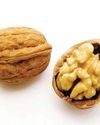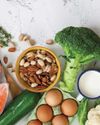
There are many reasons why people consider giving up cow’s milk and related products, but lactose intolerance is usually at the top of the list. Defined as an inability to fully digest lactose (the sugar in milk), this condition causes a constellation of unpleasant gastrointestinal issues including bloating, gas, cramps, and diarrhea. And it’s surprisingly common: an estimated 30 million to 50 million American adults experience adverse reactions to dairy. Lactose intolerance appears to have a genetic component, so some populations have an even greater risk: 60–80 percent of African Americans, 50–80 percent of Hispanics, 95 percent of Asians, and 80–100 percent of Native Americans are likely to have adverse reactions to milk and other forms of dairy.
Lactose intolerance aside, there are other compelling reasons to decrease your intake of dairy—or avoid it altogether. Some studies suggest that people who consume high amounts of dairy have a greater risk of health problems compared with those who consume small or moderate amounts. For example, excess mucus production, leaky gut syndrome, and inflammatory skin conditions are thought by some to be exacerbated by dairy.
Researchers suspect that a variety of factors, including lactose, hormones, and even calcium, could be responsible. While the science is far from definitive, some research findings are cause for concern.
Dairy May Increase Your Risk of Cancer
This story is from the February 2021 edition of Better Nutrition.
Start your 7-day Magzter GOLD free trial to access thousands of curated premium stories, and 8,500+ magazines and newspapers.
Already a subscriber ? Sign In
This story is from the February 2021 edition of Better Nutrition.
Start your 7-day Magzter GOLD free trial to access thousands of curated premium stories, and 8,500+ magazines and newspapers.
Already a subscriber? Sign In

Strike A Healing Chord
Soothe your mind, body, and spirit with three simple sound therapy techniques for self-care.

Laura's Gourmet Granola
If you’re tired of granola that’s more candy than health food, chef and entrepreneur Laura Briscoe’s offerings are just what you’ve been looking for.

News Bites
Caffeine, Peanuts, CoQ10, and Iron Deficiency.

The Overlooked Keys to a Healthy Gallbladder
Keep your bile thin and free-flowing by focusing on supportive foods, supplements, and physical activity.

Go Nutty This Year
This über-healthy alternative to traditional lattes features homemadewalnut “mylk,” along with antioxidant-rich green tea and berries.

The Three Stages of Infection
What you need before, during and after an illness, and why you need different fixes for each stage.
Taming the Flames
How to beat back chronic inflammation and protect yourself from related disease.

Deconstructing the Flexitarian Diet
How being a part-time vegan can make you healthier.

Brain Regain
How one senior used a leptin-focused diet (high-fat, no carbs) to recover from a cognitive injury, reconnect with his family, and reclaim his health.

Healthy Aging— Head To Toe
Science-backed supplements to protect all your parts.